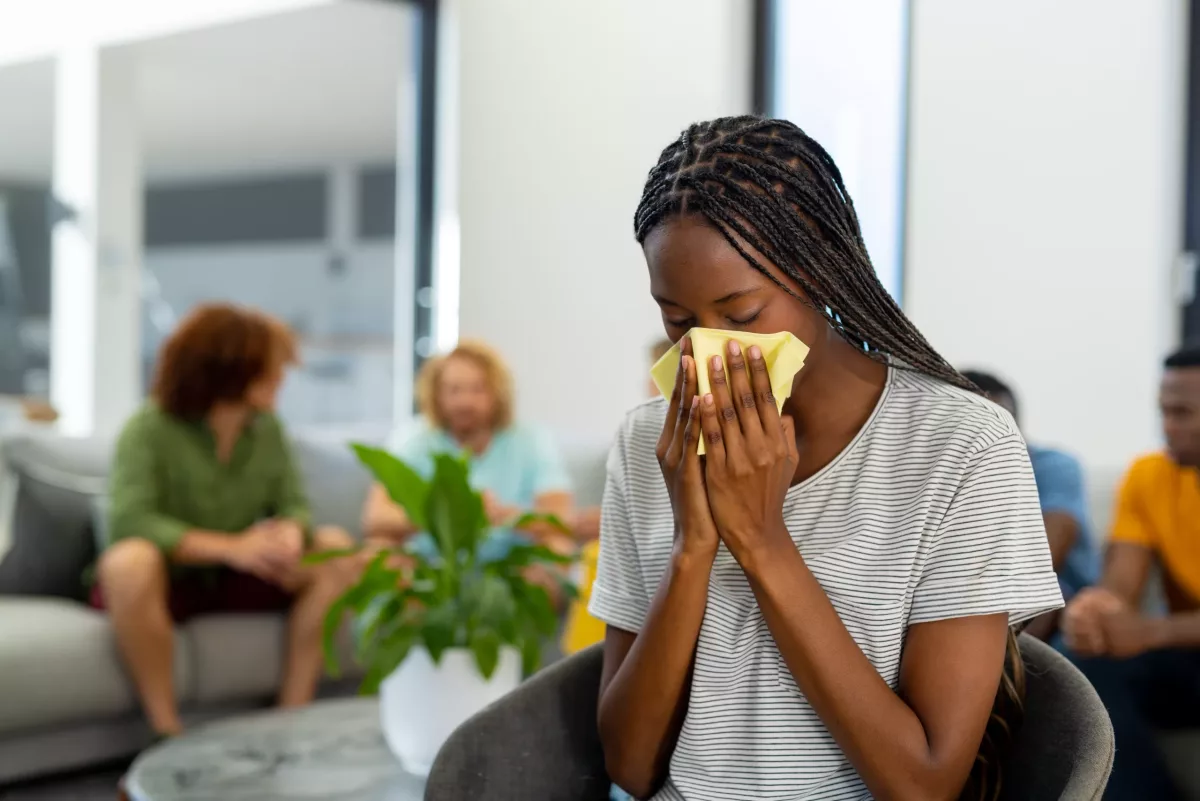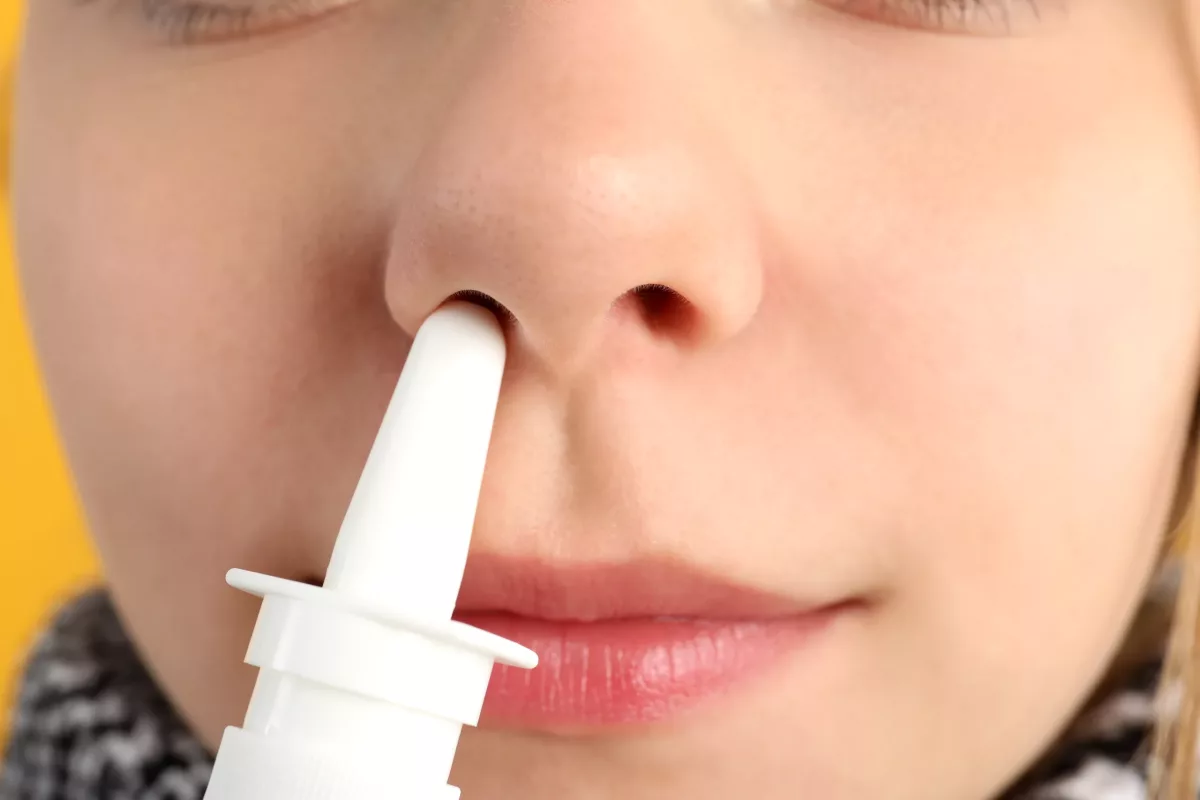An inflammation of the nasal tissues that leads to sneezing, nasal congestion, runny nose, or postnasal drip is called vasomotor (nonallergic) rhinitis. While experts understand why people with allergic rhinitis (also known as hay fever) have symptoms, they do not fully understand why people with nonallergic rhinitis experience symptoms.
However, this type of rhinitis does not happen due to allergens (including pollen, mold, pet dander, and others), and it is not caused by bacteria or viruses. Some people with this condition may experience symptoms due to weather changes, smells, exercise, certain medicines, and other triggers.
In some cases, vasomotor rhinitis is called idiopathic rhinitis. While anyone may develop this condition, it mostly affects people after age 20. Most diagnosed vasomotor rhinitis are in people between the ages of 30 and 60.
Generally, allergic and nonallergic rhinitis affects approximately 50% of the population in industrialized countries. This condition accounts for about 15% of all cases.
Symptoms
Usually, nonallergic rhinitis happens year-round compared to allergic rhinitis, which may be seasonal. Check below some symptoms that often occur in people with this type of rhinitis:
- Runny or stuffy nose
- Postnasal drip
- Sneezing
- Reduced sense of smell
In rare cases, people may develop a foul-smelling crust inside the nose, which often bleeds when people try to remove the crust. Furthermore, this is not a contagious condition because it is not caused by bacteria or viruses that may spread among people.
Causes
This type of rhinitis does not occur due to specific allergens (including tree pollen, dust, mites, or mild), but is triggered by certain substances and environmental factors.
Vasomotor Rhinitis Triggers
People usually develop nonallergic rhinitis due to the following factors. These include:
Environmental Triggers
- Cold or dry air
- Cologne or perfume
- Air pollution or smog
- A drop in temperature
- Smoking
- Pain fumes
- Spicy food
- Stress
Medicine and Drug Triggers
Some people use the following medicines and develop nonallergic rhinitis. Check below some examples:
- Nasal decongestant sprays (long-term use)
- ACE inhibitors (used to treat hypertension)
- Alpha-blockers and beta-blockers
- Nonsteroidal anti-inflammatory drugs (NSAIDs)
- Hormone medicines (such as birth control pills)
- Erectile dysfunction (ED) medications
- Certain antidepressants
- Sedatives
- Illegal drugs (such as cocaine)
Hormonal Triggers
Sometimes, a person may experience vasomotor rhinitis due to hormonal changes that often occur in the following cases. Examples include:
- Pregnancy
- Puberty
- Menopause
Risk Factors
While physicians cannot identify the exact cause of vasomotor rhinitis, they have identified some factors that could increase your risk of developing it. Check below for some examples:
- Nasal polyps
- Nervous system imbalances
- Misuse of decongestant sprays
- Emotional or psychological stress
This document does not contain all possible factors that may increase the risk of developing this type of rhinitis.
What Are The Possible Complications of Vasomotor Rhinitis?
Without treatment, this condition may cause some complications. These include:
- Sleeping disturbances (insomnia)
- Middle ear infections
- Sinusitis (inflammation of the sinus cavities)
- Difficulty concentrating or focusing
- Irritability
- Chronic respiratory conditions or asthma (rarely)
Discuss with your healthcare professional about ways to reduce the risk or prevent complications of vasomotor rhinitis.
How to Prevent Vasomotor Rhinitis?
Nowadays, the only way to prevent the symptoms of this condition is to avoid its triggers because experts do not fully understand why it happens.
Diagnosis
Usually, doctors begin the diagnosis of vasomotor rhinitis with a physical examination to check the nose and throat and ask questions about the symptoms and medical history. When it is not clear, physicians may perform some tests to confirm the condition. Furthermore, the following tests may help rule out other conditions that cause similar symptoms to vasomotor rhinitis. Check below some examples:
- Allergy testing – During this procedure, doctors will take a blood sample for testing or use a skin prick (exposure of the body to a small amount of allergens). These tests are done to check for antibodies that are often present in response to allergens.
- Nasal endoscopy – Rarely, doctors may use a long and flexible tube (endoscope) to examine the nasal passages for polyps. These polyps are often benign (noncancerous) growths of tissue.
- CT (computed tomography) scans – This is an imaging test used to get cross-sectional images of different structures and organs of the body. It helps identify nasal polyps, a deviated septum, and other health problems.
- Nasal inspiratory flow test – It is often done to measure how much air enters the lungs when you inhale. Sometimes, this test can identify blockages in the nasal passages.
Treatment
Unfortunately, there is no way to cure nonallergic rhinitis, but with early diagnosis and proper treatment, you may relieve the symptoms.
However, one way to treat this condition is to avoid triggers (such as perfumes). When it is not possible to avoid triggers, doctors may recommend over-the-counter (OTC) or prescription medicines. You can also use a humidifier at home or work because it helps lessen the symptoms. Some people get rid of symptoms by rinsing their nasal passages with a saline solution that helps clean the nose and its cavities (nasal irrigation). Moreover, some prescription medicines are often used to lessen inflammation and reduce the symptoms. Check below the most common options often recommended by doctors:
- Decongestant nasal sprays (used to lessen nasal congestion)
- Antihistamine nasal sprays (these medicines are used to reduce inflammation)
- Corticosteroid nasal sprays – Doctors usually recommend Fluticasone to relieve nasal inflammation.
- Anticholinergic nasal sprays (such as Ipratropium bromide). It helps reduce a runny nose.
When avoiding the triggers and medicines do not work, physicians may recommend surgery to repair a deviated septum or remove nasal polyps.
Frequently Asked Questions
When should I contact my doctor?
It is recommended to see a doctor if a runny or stuffy nose does not go away and you cannot identify what triggers your symptoms.
How long does vasomotor rhinitis last?
Most people who develop this type of rhinitis often experience symptoms periodically throughout the year. While symptoms may last a few days, in some cases, these symptoms may last up to several weeks. For more details, discuss it with your healthcare provider.
What foods should you avoid if you have rhinitis?
The following foods should be avoided by people with rhinitis (especially the allergic type of the disease). Check below some examples:
- Refined carbohydrates (including white bread, pastries, and others)
- Fried foods (such as French fries)
- Sugar-sweetened beverages (including soda, energy drinks, and others)
- Red and processed meat (such as hot dogs, sausage, steaks, burgers, and others)
- Fat-heavy spreads (including margarine, butter, and others)
This article does not contain all the possible foods that should be avoided by people with rhinitis. Ask your healthcare provider if you have any other questions.




